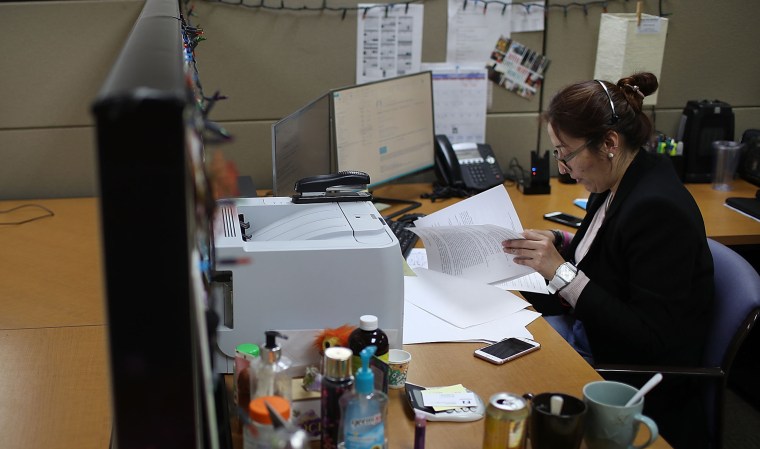Although the Deferred Action for Childhood Arrivals program has earned wide, bipartisan support, surprisingly few states actually protect Dreamers' right to earn an honest living in any occupation that requires a state license — including as barbers, engineers, nurses, plumbers or in dozens of other occupations.
That's because, when Congress and President Bill Clinton approved sweeping welfare reform in 1996, the federal government barred unauthorized immigrants from receiving numerous “public benefits,” unless a state enacts a law that explicitly makes unauthorized immigrants eligible. Curiously, federal law considers a “public benefit” to include not only food stamps, welfare or government assistance for disability, retirement or unemployment, but also professional and commercial licenses.
So, unless a state expressly legalizes licenses for Dreamers, under federal law, they are otherwise banned from working in a licensed field. Currently, the federal government and more than 40 states ban DACA recipients from obtaining occupational licenses.
Unless a state expressly legalizes licenses for Dreamers, under federal law, they are otherwise banned from working in a licensed field
It’s a complete travesty that otherwise qualified individuals can’t get the government’s permission to cut hair. Regardless of one’s position on welfare for illegal immigrants, a license is clearly different from food stamps and other government safety nets. Licenses grant people permission to work and support themselves in a given field, typically only after qualified applicants have completed hundreds (if not thousands) of hours of training and experience.
There are only a handful states that protect the right of thousands of “Dreamers” to get a professional license. Nebraska lawmakers, for instance, overrode a governor’s veto in 2016 and approved legislation to let DACA recipients earn licensing credentials. One month later, the New York Board of Regents permanently adopted a new policy to allow Dreamers to apply for teacher certifications and professional licenses in more than 50 occupations. Additionally, Florida and Illinois both allow Dreamers to become licensed attorneys, while Dreamers can apply for teaching licenses in Nevada. And in 2016, a law took effect in California that bans 40 state licensing boards from denying licenses to applicants based solely on their immigration status. (Unusually, the bill managed to win support from the ACLU, MALDEF and the Los Angeles Area Chamber of Commerce.)
Then, this month, the Indiana legislature passed a bill (S.B. 419) that will undo a surprise decision by the Indiana Professional Licensing Agency to screen license applicants based on citizenship. The IPLA has an absolutely mammoth reach, regulating over 515,000 individuals and businesses through more than 70 different licenses and over 200 types of permits. Without reform, those jobs would have stayed off-limits for Dreamers.
No longer limited to dentists and doctors, occupational licensing has become one of the biggest employment barriers in the United States.
The bill has now been signed by Gov. Pete Holcomb, who wants DACA beneficiaries to “skill up and work here in Indiana.”
The issue of licensure for Dreamers also highlights how the nation’s burdensome licensing laws keep citizens and immigrants alike from working. No longer limited to dentists and doctors, occupational licensing has become one of the biggest employment barriers in the United States. According to one study by the Brookings Institution, about 25 percent of all workers nationwide need either a license or certification to work. In other words, those government permission slips now affect more people than the minimum wage or union membership.
Many of those credentials can impose an enormous barrier to entry. Last year, the Institute for Justice published the latest version of its “License to Work” report, which analyzed licensing burdens for over 100 lower-income occupations in all 50 states and Washington, D.C. On average, an occupational license forces workers to finish nearly a year of education or experience, pay $267 in fees and pass an exam.
So even if more states legalize licenses for Dreamers, getting one will remain burdensome.
Reducing the burden of licensure or repealing the requirements for many licenses is crucial to expand economic opportunity.
The evidence suggests that stricter licensing requirements stymie entrepreneurship among immigrant communities. According to a 2015 report by Stephen Slivinski, a senior research fellow at Arizona State University, “occupational licensing statutes place a disproportionate burden on immigrants trying to start their own businesses,” since immigrants are more likely to work in the service industry, which is more heavily licensed than other sectors of the economy.
More generally, after Slivinski matched an earlier data set from IJ’s “License to Work” with data on immigrant entrepreneurial activity from the Kauffman Foundation, he found that “states with heavier-than-average licensing burdens have an average immigrant entrepreneurship rate that is nearly 11 percent lower than average.”
Reducing the burden of licensure or repealing the requirements for many licenses is crucial to expand economic opportunity. With fewer licenses, both citizens and DACA recipients would face fewer obstacles that would otherwise block their chosen careers and stand in the way of achieving their own American Dream.
Nick Sibilla is a writer and legislative analyst at the Institute for Justice, a public interest law firm.
